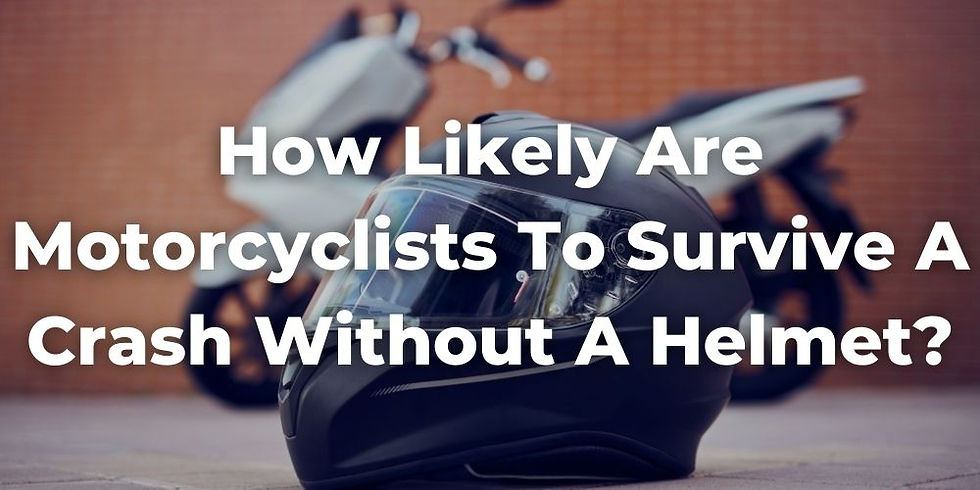What Are the Odds of Surviving a Motorcycle Accident Without a Helmet?
- Tom Fowler

- Feb 25, 2022
- 3 min read
As exciting as the thrill of speed might be, any road traffic participant needs to be aware of its consequences. Even someone else's speeding, inattentive driving, or driving under the influence can lead to innocent people getting injured in an accident — or even losing their lives.
Of all traffic accidents, car crashes are the most common but have the highest survival rate because the vehicle serves as a shield. Not to mention, in comparison to cars and other bigger motor vehicles, motorcycles are harder to be seen on the road. However, what happens to unprotected motorcyclists who get in an accident? What are the odds of surviving a motorcycle accident without a helmet? Personal injury attorneys at Tom Fowler Law Firm provide the answer, tackling the importance of wearing helmets when riding a motorcycle.

How Likely Are Motorcyclists to Survive a Crash Without a Helmet?
The chances of surviving a motorcycle accident in general aren't all that great to begin with. According to the National Highway Traffic Safety Administration, motorcyclists are 29 times less likely to survive a crash than passenger vehicle occupants. The same data from 2019 showed that motorcyclists were also four times less likely to go without injuries. Exactly 5,014 people were recorded to have died in motorcycle accidents that year.
Still, no motorcycle accident is the same. The motorcycle accident survival rate depends upon many factors, including (but not limited to):
● motorcyclist's speed (and that of other drivers involved)
● collision type
● receiving medical attention in time
● helmet usage
Looking at the last one, one can't help but notice what sets it apart from other factors on the list. The decision of whether or not to use a helmet is entirely up to the driver and other people riding as passengers — much like wearing a seatbelt. Still, not everyone chooses to do it, and people who don't seem to be much less likely to survive a crash. In line with this, out of around 4,500 motorcycle accident fatalities in America every year, 37% involve head injuries.
How Effective Are Helmets?
A 2021 study compared the rates of motorcycle accident mortalities due to head injuries across different states. It showed that this rate was 33% lower in the states that had helmet laws. As it turns out, motorcycle helmet laws do save many lives.
Somewhat less recent data, from 2016, found that helmets reduce the risk of head injury by as much as 69%. They also decrease the risk of fatality by 37%.
Wearing the Helmet Properly Also Increases Survival Chances
As for helmet usage, what also matters is whether the motorcyclist does it right. Namely, wearing a helmet that doesn't follow the necessary regulations may prove less effective. For instance, helmets should meet the DOT minimum safety standards to be considered useful. Such helmets will have a certification sticker that indicates their safety.
Overall, there are a few standards an effective helmet should meet. First of all, the helmet should be the right size to fit perfectly over its owner's head. It should also fit tightly around the ear and chin area. If it doesn't, its owner might need to fasten the strap on the helmet to secure protection. An effective helmet also needs to cover the forehead, starting just above the eyebrows.
Not Wearing a Helmet Doesn’t Affect Liability
There still seems to be good news for the motorcyclists who decide against wearing a helmet for some reason. Should they get in an accident where they aren't at fault, their lack of a helmet won't affect the case. Put differently, they won't be held accountable for the accident.
Still, not wearing a helmet can affect the compensation this person gets. The reason is that the defendant's insurance company will likely try to prove that the lack of a helmet is to blame for the injuries sustained. Naturally, this only applies to head injuries. Either way, any motorcyclist who's suffered head injuries due to not wearing a helmet should expect lower compensation.
Final Remarks
Motorcycle accidents in which drivers and their passengers don't wear helmets seem to have a much larger mortality rate than those where helmets are used. Wearing a helmet significantly increases the odds of surviving a motorcycle accident. However, it is crucial that a motorcyclist should wear their helmet properly. Only then can they expect to survive the accident without severe head injuries and hope to get the monetary compensation they deserve.
With or without helmet, however, it is important for a motorcycle owner to have their vehicle insured. If you are using someone else's motorcycle but still want to be 100% secured, no need to worry—you may insure a motorcycle you do not own by following the right process.
When it comes to getting compensation for motorcycle injuries, you will be needing a good motorcycle accident lawyer in Des Moines IA.

Comments